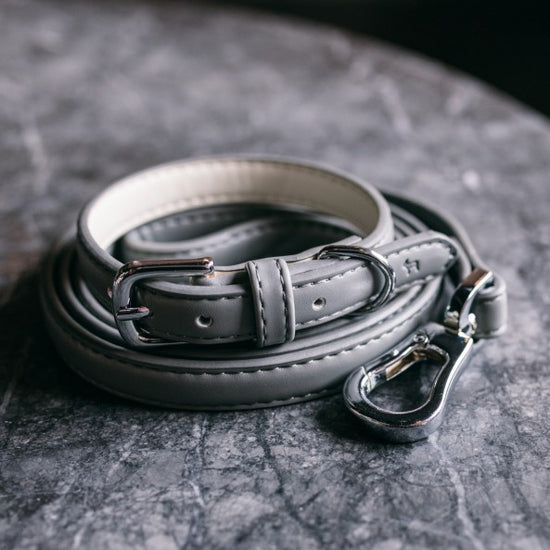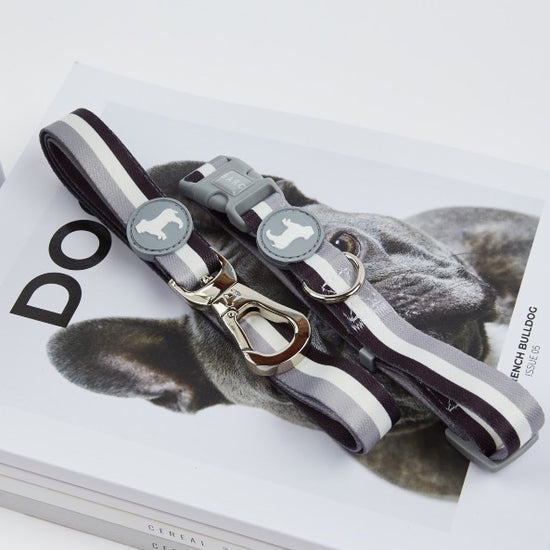Dog Collar Guide
- How to measure your dog for a collar:
- Which material is best for dog collars?
- Things to consider when choosing a dog collar:
- Frequently Asked Questions (FAQs)

How to measure your dog for a collar:
A correctly fitted dog collar is essential to ensuring your dog’s comfort both at home and outdoors.
Collars that are too loose can put dogs at risk during walks, and dog collars that are too tight can restrict breathing, cause skin irritation and neck discomfort.
Before you buy a new dog collar, it’s important to measure your dog’s neck size correctly.
All collars come in different sizes, which is why you should always check the specific size guide for the brand of dog collar you’re purchasing. (It’s never a good idea to measure an old collar to compare sizes.)
To measure your dog for a collar correctly:
Accurately measuring a dog collar is simple, and taking the time to do this will help your dog stay comfortable and safe at all times. To correctly fit a dog collar, follow our step by step measuring instructions:

Step 1 - Find a tape measure:
You’ll need a measuring tape to do this. We recommend using a soft measuring tape for flexibility. If you don’t have a cloth tape measure to hand, you can use a piece of string and lay it out against a ruler, but this might result in less accurate measurements.

Step 2 - Measure your dog’s neck:
Gently fit the soft measuring tape around the widest part of your dog’s upper neck. Compared to harnesses, collars are positioned to sit higher up. As you wrap the tape around the neck, make sure that it's not fitted too tightly or loosely.

Step 3 - Ensure a comfortable fit:
Once the measuring tape has been fitted around your dog’s upper neck, you’ll need to check that you have left enough space for a snug fit. You should be able to easily fit two fingers between your dog's neck and the tape. (This is referred to as the 'two-finger rule').
Finding the best dog collars (UK)
The best dog collars are made from high-quality materials and are designed to be comfy, safe and durable.
In the UK, there are lots of different types of dog collars to choose from. The best dog collar will depend on your dog’s age, breed and size, but you also should be mindful of your dog’s individual needs.
For example, some dogs are allergic to leather, so choosing a leather dog collar would likely result in skin irritation and discomfort.
What material is best for dog collars?
The most comfortable dog collars are soft on dog skin and fur with a slight padding to prevent rubbing and friction.
Nylon tends to be the most popular material for dog collars, offering a lightweight and breathable design that also provides strength and security for walks.
Before choosing the best material for your dog’s collar, find out more about each fabric.
Types of Dog Collars:
Nylon Dog Collars
As mentioned, a nylon dog collar is a common choice for UK dog owners. Great for everyday use, nylon dog collars are an affordable option and offer a number of benefits to dogs of all sizes:
- Usually made from nylon webbing, which is known for its strength and durability
- Lightweight and breathable, so you don’t need to worry about the collar being too heavy as it sits around your dog’s neck
- Freely available to be purchased in lots of different colours, patterns and styles.
- Nylon fibres tend to be long lasting. Dirt is less likely to cling to nylon, making these collars easy to clean and take care of.
Top tip: Over time, some fabric dog collars can start to fray around the edges. For this reason, it’s important to choose a nylon dog collar with quality stitching.
Leather Dog Collars
Leather dog collars are another popular go-to for dog owners. Made from natural materials, these collars are also durable and long-lasting, but they can be more expensive than other fabrics.
Bear in mind that leather dog collars are not animal-cruelty free, and some dogs suffer contact dermatitis as a result of leather collar allergies. The benefits of choosing a leather collar include:
- Biodegradable material
- Softens over time
- Resistant to wear and tear
Vegan Leather Dog Collars
A popular alternative to leather are vegan leather dog collars. Vegan products are becoming increasingly sought after, as more and more people turn to cruelty-free products.
These days, vegan leather is able to offer the same high quality design and aesthetic, with the additional benefit of being ethically sourced. As a lightweight fabric, it is a great option for dogs of all sizes, and can also be used by dogs that are allergic to animal skin.
- Waterproof dog collar option that can be used in all weathers
- Soft, supple and flexible fabric which is soft on dog's fur
- Mimics genuine leather without using animal-based materials
- A cost effective option that comes in lots of colours and finishes
- Vegan padded leather helps to provide additional comfort
BioThane Dog Collars
If you own a dog that loves to splash around in water, BioThane is a good choice! These collars are extremely resistant to elements, so they can be used for adventuring outdoors with your dog. They tend to be made from a combination of polyester and polyurethane, and can be easily cleaned after use.
- A type of vegan dog collar, made from non-toxic materials
- Water resistant, making it easy to clean and maintain over time
- BioThane is impermeable, which means dirt and mud can be washed off with little-to-no residue
Rope Dog Collars
Many dog owners are surprised to find out that rope is a material used to make collars. They tend to be hard-wearing, and are not likely to unravel or get worn down.
While they aren’t as aesthetically pleasing as other collar options, they are strong and protective without feeling rough on a dog’s skin or fur.
Considerations for choosing a dog collar:
- Is it the right fit for my dog’s age, size and breed?
- Can it be suitably used as a puppy collar?
- Does it accommodate my dog's allergies or sensitive skin?
- Has it been made from a soft, non-abrasive material?
- Is it cost-effective without compromising on quality?
- Is the total weight of the collar and its buckles light enough?
- Can I use this collar on rainy days? Does it feature waterproof and breathable functions?
- Do I want a dog collar that can be bought as a matching collar and lead set?
🐶


